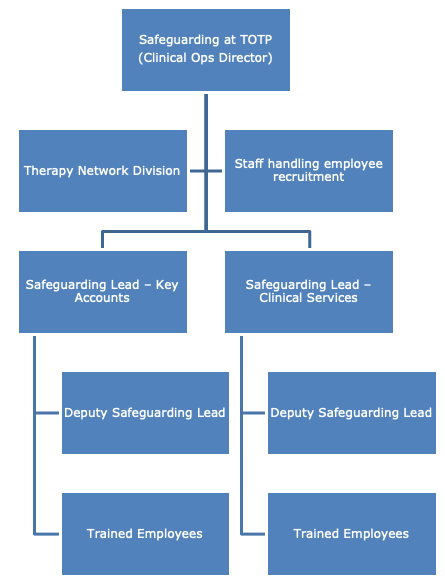Safeguarding Policy
Children & Vulnerable Adults
Introduction
The OT Practice is committed to keeping children and vulnerable adults, safe and acknowledges its duty to act appropriately to any allegations, reports or suspicions of abuse.
This policy (and separate procedural guidance) is in place so that all managers, staff, and Associates can work to prevent abuse and know what to do should a concern arise.
This policy also enables referrers/commissioners and clients to understand how The OT Practice seeks to keep children and vulnerable adults safe.
The Purpose & Scope of the Policy
The policy and procedures have been drawn up in order to enable The OT Practice to:
- promote good practice and work in a way that can help prevent harm and abuse occurring.
- ensure that any allegations of abuse or suspicions are dealt with appropriately and the person experiencing abuse is supported.
The policy and procedures relate to the safeguarding children (those under age 18) and also vulnerable adults, who are defined as individuals aged over 18 who:
- Have needs for care and support (whether or not the local authority is meeting any of those needs) and;
- is experiencing, or at risk of, abuse or neglect; and
- as a result of those care and support needs is unable to protect themselves from either the risk of, or the experience of abuse or neglect. (Care Act, 2014)
The policy applies to all managers, staff and associates and anyone working on behalf of The OT Practice.
It is acknowledged that significant numbers of children and vulnerable adults at risk are abused and it is important that The OT Practice has a safeguarding policy, a set of procedures to follow and puts in place preventative measures.
In order to implement the policy and procedure, The OT Practice will work to:
- stop abuse or neglect wherever possible;
- prevent harm and reduce the risk of abuse or neglect to vulnerable adults and children;
- promote the wellbeing of the adult(s) or child(ren) at risk in safeguarding arrangements;
- raise awareness of safeguarding adults and children to ensure that everyone can play their part in preventing, identifying and responding to abuse and neglect;
- provide information and support in accessible ways to help people understand the different types of abuse, how to stay safe and what to do to raise a concern about the safety or well-being of an adult or child.
The OT Practice has the following in place:
Training
- Staff are required to complete mandatory safeguarding training within their initial induction period and receive annual refresher training thereafter.
- Associates are required to undergo annual safeguarding training and completion of this is demonstrated within our Fitness to Practice documentation.
- Training covers types of abuse or neglect, how to recognise this and how to report concerns.
Safer Recruitment Practices
- Staff involved in recruitment undergo Safer Recruitment training and follow these principles in the recruitment of staff and Associates.
- The relevant background check such as DBS (England & Wales) PVG (Scotland) or AccessNI (Northern Ireland) are completed for all staff and Associates.
- Our therapists will regularly be required to assess and/or provide therapy to children or young people in schools or colleges. We are conversant with the ‘Keeping Children Safe in Education’ (Department for Education, 2021) guidance and can provide confirmation that the necessary checks have been undertaken.
Confidentiality & Sharing Information Arrangements
- Wherever possible, The OT Practice will gain permission from the relevant individual before sharing information about them with another agency.
- However, in accordance with our Privacy Policy, where we believe a person is in danger/at risk or a crime has been committed, then a decision may be taken to pass information to another agency without the individual’s consent. This may also be the case if seeking to obtain consent would increase the risk to an individual.
Making Referrals
- As a UK-wide Practice our clients will be based in a large variety of different Local Authorities. Where required we will make a safeguarding referral to the relevant Local Authority.
- The OT Practice will ensure that Safeguarding Leads understand their responsibility to refer concerns to the relevant statutory agencies, i.e., Local Authority or Police.
Governance & Structure
The OT Practice’s Clinical Operations Director holds overarching responsibility for Safeguarding at The OT Practice including policy, training, culture and strategy.
The OT Practice has Designated Safeguarding Leads in each Clinical Operations department to act as first point-of-contact for staff, associates and any other individuals in relation to any safeguarding concerns. Designated Safeguarding Leads carry responsibility for the management of any safeguarding concerns, delivering training within their teams and contributing to policy and procedure. Deputy Safeguarding Leads are in place within each division of the company and all staff receive appropriate training as outlined above.

We are committed to reviewing our policy and good practice annually.

